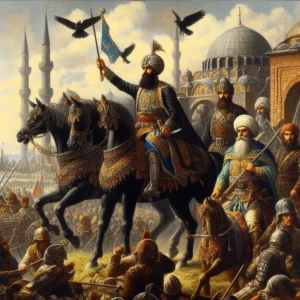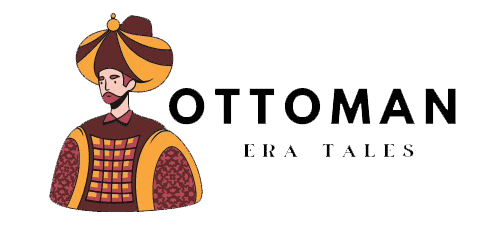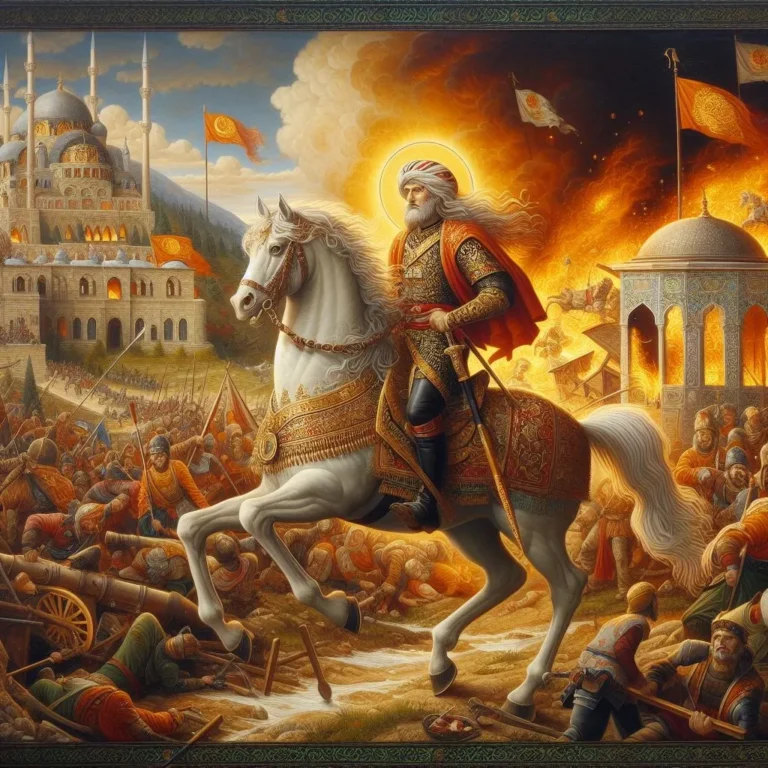Orhan Gazi, son of Osman I, returned to the golden age of the Ottoman Empire, where one man’s legacy of leadership and bravery continues to inspire generations. Join us as we delve into the life and accomplishments of Orhan Gazi, a true titan who shaped history with his strategic prowess and unwavering dedication. Learn how this remarkable leader left an indelible mark on the world, paving the way for future rulers and leaving behind a legacy that still resonates today. Discover the story of Orhan Gazi: A Legacy of Leadership in the Ottoman Empire.
Introduction to Orhan Gazi and the Ottoman Empire
The Ottoman Empire was one of the most powerful and influential empires in history, spanning over 600 years from its beginnings in the late 13th century to its collapse after World War I. At its height, it stretched across three continents, encompassing modern-day Turkey, parts of Europe, Asia, and Africa. The rise of this empire was mainly due to the leadership of a great ruler named Orhan Gazi.
Orhan Gazi was born in 1281 as the second son of Osman I, the founder of the Ottoman dynasty. As a young prince, he showed great potential for leadership and military prowess. When his father passed away in 1326, Orhan succeeded him as ruler and continued his legacy by expanding their territory through conquests.
One significant event that marked Orhan’s reign was his conquest of Bursa in 1326. This city would become the first capital city of the Ottoman Empire and serve as a base for further expansion into Byzantine territories. Under Orhan’s leadership, the Ottomans captured many strategic towns such as Nicaea, Nicomedia, and Bursa.
Aside from being a skilled military leader, Orhan also implemented necessary administrative reforms that strengthened the empire’s structure. He established a centralized government with clear roles for different officials and created an organized taxation system. These changes helped solidify their control over conquered lands and ensured efficient governance throughout their vast empire.
Furthermore, Orhan was known for tolerating other religions and cultures within his domain. He allowed people of different faiths to practice their beliefs freely under his rule and even appointed non-Muslims to important positions in government. This religious tolerance helped foster peace among diverse communities within the empire.
Under Orhan’s wise leadership, trade flourished within the empire, resulting in economic growth. The Ottomans became known for producing high-quality textiles, ceramics, and other goods, which were highly sought after in Europe and Asia. This economic prosperity further fueled the empire’s expansion and power.
Orhan Gazi played a crucial role in shaping the Ottoman Empire into one of the most formidable empires in history. His strategic military conquests, administrative reforms, religious tolerance, and economic policies laid a strong foundation for future rulers to build upon. His legacy of leadership continues to be admired and studied by historians even today.
Early Life and Education of Orhan Gazi:
Orhan Gazi, also known as Orhan I, was the second ruler of the Ottoman Empire and is celebrated for his contributions to its growth and expansion. He was born in 1281 or 1288 in Söğüt, a small village in modern-day Turkey. His father was Osman I, the founder of the Ottoman dynasty, and his mother was Malhun Hatun.
As a young boy, Orhan Gazi received a traditional education that included reading, writing, Islamic studies, and military training. His father instilled strong values of leadership and courage from an early age. Under his guidance, Orhan learned about warfare strategies and tactics, which would prove invaluable in his future role as ruler.
At 18 or 24 (there are conflicting accounts), Orhan succeeded his father as leader of the Ottoman tribe after Osman’s death. He faced many challenges as he took over a tiny principality surrounded by hostile neighbors such as the Byzantine Empire and other Turkish tribes.
Frequent clashes with neighboring states marked Orhan’s early reign as he worked to establish and expand his territory. However, despite these obstacles, he proved to be a competent leader with excellent political acumen. His first significant conquest came when he captured Bursa from the Byzantines in 1326.
Under Orhan’s rule, Bursa became the first capital city of the Ottoman Empire. It was a political center and an essential cultural hub where scholars gathered to exchange ideas and knowledge.
Apart from being a skilled military strategist and leader, Orhan also had a deep interest in culture and education. He established madrasas (Islamic schools) throughout his empire, where students could study theology, law, literature, mathematics, and science.
Orhan’s art patronage also contributed to the growth of the Ottoman Empire’s cultural identity. He commissioned many architectural projects, including mosques, palaces, and public buildings, which reflected a blend of Islamic and Byzantine influences.
In addition to his military and cultural achievements, Orhan was known for his benevolent rule. He supported and protected minority communities within his empire and promoted trade and commerce, leading to economic prosperity.
Orhan Gazi’s early life and education significantly shaped him into a visionary leader who would leave a lasting legacy in the history of the Ottoman Empire. His strong foundation in traditional education and his natural leadership abilities allowed him to navigate challenges successfully and establish an empire that would last for centuries.
Rise to Power: From Son to Sultan
The rise to power of Orhan Gazi, also known as Orhan I, was a significant moment in the history of the Ottoman Empire. He was the second ruler and founder of the Ottoman dynasty, succeeding his father, Osman I. Orhan’s journey to becoming a powerful Sultan began when he was chosen by his father to follow him as the leader of their growing empire.
As a young prince, Orhan had already demonstrated leadership skills and military prowess. He accompanied his father in numerous battles, learning valuable strategies and tactics. When Osman passed away in 1326, at 67, it was clear that Orhan was destined to take over as Sultan.
Orhan’s first challenge as Sultan was establishing himself as a strong and capable leader among rival neighboring empires. This was no easy feat for a newly appointed ruler whose legacy had yet to be found. However, with determination and strategic planning, Orhan significantly expanded the empire’s territory during his reign.
One of his most notable achievements was capturing Bursa from the Byzantine Empire in 1326 and making it the capital city of the Ottoman Empire. This conquest marked an important milestone in solidifying their presence in Anatolia (modern-day Turkey) and establishing themselves as a dominant force in the region.
Another critical aspect that contributed to Orhan’s success and rise to power was his shrewd diplomacy skills. He formed alliances with neighboring empires such as Bulgaria and Serbia while maintaining friendly relations with others like Venice and Genoa. These diplomatic maneuvers helped create stability within the empire while expanding its influence beyond its borders.
Furthermore, one cannot ignore Orhan’s ability to inspire loyalty among his subjects through just governance. He implemented fair laws and policies that benefited Muslims and non-Muslims living under Ottoman rule. This approach towards governance earned him respect from different religious groups within his empire and further solidified his position as a just ruler.
Orhan’s legacy of leadership in the Ottoman Empire was also characterized by his military campaigns, which significantly expanded the empire’s territory. He led successful campaigns against various kingdoms, including Byzantine and Serbian forces, making him a formidable force to be reckoned with.
Orhan Gazi’s rise to power from being a son to becoming Sultan was guided by his strong leadership skills, strategic thinking, diplomatic maneuvers, and just governance. His achievements paved the way for future Ottoman rulers and set the foundation for one of the most renowned empires in history.
Key Accomplishments and Contributions as Sultan
As the second leader of the Ottoman Empire, Sultan Orhan Gazi’s accomplishments and contributions played a crucial role in shaping the empire into a powerful force spanning over six centuries. From his military conquests to his administrative reforms, Sultan Orhan Gazi left behind a legacy of leadership that continues to be admired and studied.
One of Sultan Orhan’s most significant accomplishments was expanding the Ottoman territories through military conquests. He continued his father Osman’s expansionist policies and launched successful campaigns against neighboring Byzantine cities, such as Bursa and Nicomedia. Under his rule, the Ottomans conquered other Anatolia regions, including Izmit, Iznik, and Yarhisar. These victories brought wealth and resources to the empire and solidified its power in the area.
In addition to military successes, Sultan Orhan made essential contributions to administration and governance. He established a centralized system of government with himself at the center as an absolute ruler. He appointed officials known as “beys” to oversee different regions within the empire and implemented tax reforms to ensure the fair distribution of wealth among citizens. This efficient system allowed for better control over conquered territories and provided stability within the empire.
Sultan Orhan also proved to be a skilled diplomat during his reign. One notable example is when he allied with Serbia against their common enemy – Byzantium. This alliance strengthened ties between two powerful regional empires and helped expand Ottoman influence even further.
Furthermore, Sultan Orhan was known for promoting religious tolerance within his empire. Despite being a Muslim ruler, he allowed Christians living under Ottoman rule to practice their faith freely without facing persecution or discrimination. This policy not only garnered support from non-Muslim subjects but also helped create an atmosphere of coexistence within society.
Sultan Orhan’s contributions were not limited to politics; he also had a lasting impact on art and architecture in the Ottoman Empire. He commissioned the construction of several mosques, madrasas, and public buildings, including the famous Orhan Gazi Mosque in Bursa. These structures showcased a blend of Byzantine and Islamic architectural styles that became characteristic of Ottoman architecture.
Sultan Orhan Gazi’s accomplishments and contributions as a leader were instrumental in establishing the foundation for the mighty Ottoman Empire. His military conquests, administrative reforms, diplomatic skills, religious tolerance, and patronage of art and architecture all played a crucial role in shaping the empire into one of the most influential in history.
Legacy of Leadership: Lessons from Orhan Gazi’s Rule

Orhan Gazi, also known as Orhan Bey or Orhan I, was the second ruler of the Ottoman Empire and the son of its founder, Osman I. He is remembered not only for his military conquests and expansion of the empire but also for his leadership skills and legacy that left a lasting impact on future rulers.
One of the most significant lessons that can be learned from Orhan Gazi’s rule is his ability to unite and govern a diverse population. The Ottoman Empire comprised various ethnic and religious groups, including Turks, Greeks, Armenians, Jews, and Christians. Despite these differences, Orhan Gazi implemented policies that promoted tolerance and acceptance among these communities. He allowed them to maintain their customs and traditions while being part of the enormous empire.
Another critical aspect of Orhan Gazi’s leadership was his strategic thinking and military tactics. He continued his father’s expansionist policies by conquering new territories and establishing control over trade routes. However, he also recognized the importance of diplomacy in maintaining peace with neighboring empires. He signed treaties with Byzantine leaders and allied with other rulers to strengthen the empire’s position.
Moreover, Orhan Gazi was known for his just rule and fair treatment of all citizens regardless of social status or religion. He established a system where grievances could be heard by a council composed of representatives from different communities within the empire. This helped maintain stability within the empire, giving people a sense of justice and fairness under their ruler.
Orhan Gazi’s rule also saw architectural, literature, science, education, and commerce advancements. He encouraged scholars to translate Greek texts into Turkish, leading to an intellectual renaissance in the empire. This cultural exchange helped shape one of history’s greatest empires.
Perhaps one of Orhan Gazi’s most enduring legacies is establishing a strong central government and administrative system. He reorganized the empire into provinces and appointed governors to oversee their affairs. This efficient system of governance enabled the Ottoman Empire to function smoothly and efficiently, laying the foundation for its future success.
Orhan Gazi’s rule left a lasting legacy of leadership that continues to inspire leaders even today. His ability to unite a diverse population, strategic thinking in military matters, just rule, cultural advancements, and strong governance are all valuable lessons that can be learned from his reign. It is no wonder that he is remembered as one of the most influential rulers in Ottoman history.
Impact on the Ottoman Empire and Beyond
The reign of Orhan Gazi had a significant impact on the Ottoman Empire and beyond. During his rule, the empire experienced substantial political, military, and cultural developments that shaped it into a powerful regional force.
One of the most significant impacts of Orhan’s leadership was his expansionist policies, which greatly expanded the territory of the Ottoman Empire. Under his rule, the Ottomans conquered several key cities and regions, including Bursa, Izmit, and Nicaea. These conquests increased the size of their land and provided valuable resources and strategic advantages.
Moreover, Orhan’s military campaigns were not limited to just territorial expansions. He also fought against neighboring empires such as the Byzantine and Serbian Empires. His victories over these powerful forces solidified Ottoman dominance in Anatolia, establishing them as a significant player in Eastern Europe.
Orhan’s legacy also includes significant administrative reforms that laid the foundation for an efficient government structure within the Ottoman Empire. He introduced a system known as “Timar,” where soldiers were granted land in exchange for their services to the state. This helped establish a standing army while ensuring its soldiers’ loyalty through land ownership.
In addition to political and military achievements, Orhan’s reign witnessed considerable cultural advancements. He encouraged trade with neighboring regions and established strong economic ties with European powers like Venice and Genoa. This led to an influx of wealth into the empire, allowing for grand architectural projects to be undertaken, such as mosques, schools, hospitals, and public baths.
Furthermore, under Orhan’s patronage, Islamic scholars from various parts of Asia flocked to Bursa (the new capital), making it a center for learning and culture. The translation of ancient Greek texts into Arabic flourished during this period, further contributing to intellectual growth within the empire.
Beyond its borders, Orhan’s legacy extended far-reaching influences on other empires and regions. Under his leadership, the Ottoman Empire’s conquests ended the Byzantine Empire, paving the way for future Ottoman expansion into Europe.
Orhan Gazi’s legacy as a leader of the Ottoman Empire is significant. His military victories, administrative reforms, cultural developments, and expansionist policies laid the foundation for a mighty empire shaping history in Eastern Europe and Asia Minor.
Enduring Influence: Remembering Orhan Gazi Today
Orhan Gazi, the second leader of the Ottoman Empire, is often remembered as a wise and just ruler who laid the foundations for one of the greatest empires in history. His legacy continues to be celebrated and studied today, with his impact on the empire and its people still felt centuries after his reign.
One of Orhan’s most enduring influences was his strategic leadership style. He was known for his ability to make calculated decisions, considering both short-term gains and long-term consequences. This approach allowed him to expand the empire’s borders through strategic alliances and military campaigns while maintaining stability within the existing territories.
His leadership also extended beyond the battlefield. Orhan patronized education and encouraged advancements in sciences, arts, and literature. He established schools and libraries throughout his empire, promoting intellectual growth among his people. This emphasis on education helped foster a culture of innovation and excellence that continued throughout the later years of Ottoman rule.
Orhan’s diplomatic skills were also crucial in solidifying trade relationships with neighboring regions and establishing peaceful coexistence with other empires. His policies promoted religious tolerance towards non-Muslims living under Ottoman rule, earning him respect from diverse communities.
Furthermore, Orhan’s legacy includes significant architectural achievements still admired today. The construction of Bursa as the first capital city of the Ottoman Empire under his rule saw numerous monumental structures built in grand Islamic architecture styles such as mosques, madrasas (Islamic schools), hammams (bathhouses), bridges, caravanserais (travelers’ inns), among others.
The success achieved during Orhan’s reign laid down solid foundations for future generations to build upon. Under his leadership, he transformed what started as a tiny principality into an influential empire whose influence extended far beyond its borders.
Today, Orhan Gazi is remembered as a great ruler and a symbol of unity and strength. His legacy inspires leaders worldwide, with his principles of diplomacy, education, and strategic leadership still relevant in modern times.
Orhan Gazi’s enduring influence is evident in various aspects of the Ottoman Empire’s legacy. Whether through his military strategies, diplomatic skills, patronage of education and arts, or architectural achievements, his impact continues to shape our understanding of the empire and its history. No wonder he is remembered today as a leader who left a powerful and lasting legacy.
Conclusion: Honoring the Legacy of Orhan Gazi
Orhan Gazi’s legacy of leadership in the Ottoman Empire continues to inspire and influence generations even today. His accomplishments as a military strategist, political leader, and builder have left an indelible mark on history.
Through his military prowess, Orhan Gazi expanded the borders of the Ottoman Empire and solidified its position as a formidable power in the region. He successfully navigated challenges and conflicts to establish a strong foundation for future rulers. His leadership during times of war was characterized by strategic thinking, bravery, and perseverance.
As a political leader, Orhan Gazi implemented policies that promoted unity and stability within his empire. He recognized the importance of maintaining good relations with neighboring states and established diplomatic ties with various leaders. This helped foster peaceful coexistence and trade opportunities, leading to economic prosperity for the empire.
Orhan Gazi’s contributions to architecture also cannot be overlooked. Under his rule, many significant buildings were constructed or renovated in cities under Ottoman control. These structures served functional purposes and reflected the grandeur and magnificence of the empire.
Furthermore, Orhan Gazi’s legacy extends beyond his achievements as a ruler; it also includes his character traits that made him beloved by his people. He was known for being just, fair, and compassionate towards his subjects regardless of religion or social status. He showed great respect for diversity within his empire and emphasized religious tolerance.
Today, we honor Orhan Gazi’s legacy by recognizing him as a symbol of strength, courage, wisdom, and compassion – qualities that embody authentic leadership. His contribution to shaping the Ottoman Empire into one of history’s greatest civilizations cannot be overstated.
As we look back on Orhan Gazi’s life and accomplishments 700 years later, it is clear that he left an enduring mark on history through his leadership and legacy. His story serves as a reminder that one can overcome challenges and achieve greatness with determination, perseverance, and a strong vision.
Orhan Gazi’s impact on the Ottoman Empire is a testament to his exceptional leadership abilities and unwavering dedication to his people. He will forever be remembered as an iconic figure whose legacy inspires leaders worldwide.


